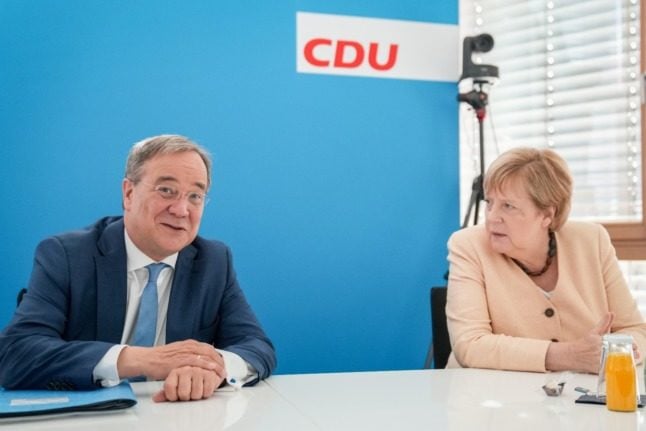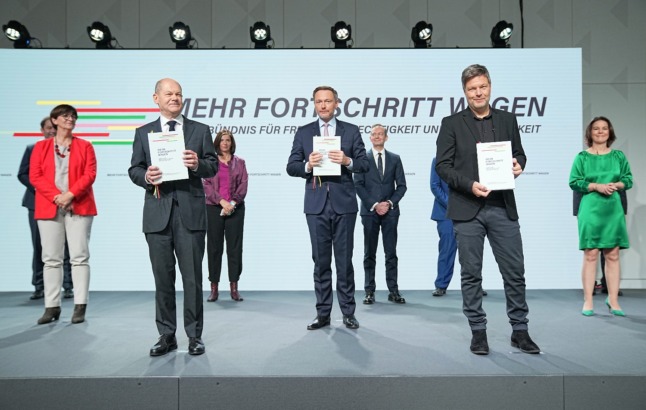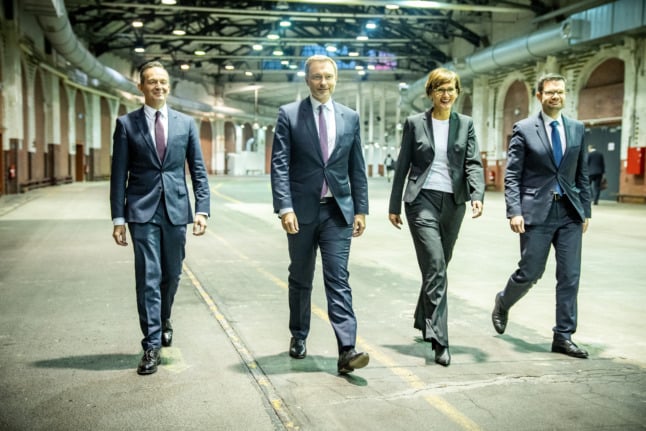After a disappointing campaign so far, Armin Laschet – the CDU/CSU (Union) candidate hoping to win Chancellor Angela Merkel’s job at the September 26th federal election – had another trick up his sleeve to try and convince voters that he is the right choice.
On Monday Laschet launched the Union’s 100-day ‘immediate programme’ or Sofortprogram promising swift action if he gains power, including some financial relief for large groups of voters.
It was clearly an attempt to reverse the recent polls where his rival – the SPD’s Olaf Scholz – has gained the top spot.
It came after a fiery TV duel that saw Laschet and Scholz swipe at each other repeatedly, while the Greens’ Annalena Baerbock also laid into both. The debate was watched by nearly 11 million people in Germany.
READ ALSO:
- Laschet and Scholz trade blows in heated German election debate
- Who will replace Angela Merkel as German chancellor?
In a snap poll after the 90-minute debate on Sunday evening, viewers decided that Scholz was the winner, while Baerbock scored highest on likeability.
Laschet on Monday said he was unfazed. He spoke of a successful weekend for the conservatives – from the “great CSU party conference” held on Saturday to the TV Triell, and the local elections in Lower Saxony, where the CDU became the strongest force.
“Polls are polls, in the end it’s the voters who decide,” said Laschet.
Some polls from the debate coming through
Who was seen as the most likable:
Laschet 18%
Scholz 34%
Baerbock 39%Who seemed the most competent:
Laschet 26%
Scholz 49%
Baerbock 18%#AnneWill #Triell pic.twitter.com/q1d3zZpG3D— Aggi (@aggichristiane) September 12, 2021
Can the conservatives catch up?
It’s true that this election campaign has been surprising so far and it may all be still to play for.
But with less than two weeks to go, the SPD with the stable-like (read: Merkel) influence of Scholz as their chancellor candidate, has been enjoying a steady resurgence for some time.
So it’s easy to see why Laschet has now released a plan to try and connect with the German public.
“You can rely on the CDU and CSU in uncertain times,” Laschet said when launching the six-point plan. “There are six packages on the important issues that we want to tackle immediately in the 100 days after the election.”
The plan promises to “lead our country out of the crisis stronger than before”.
The prerequisite for this is that the CDU/CSU governs again – and in a bid to make sure that happens, the party is directing some promises at its classic target groups: the middle class, families, the police and emergency services and farmers.
The programme is based on the Union’s manifesto, but some points have been expanded, and the 100 day promise is aimed at showing voters that action will be taken quickly.
READ ALSO:
- No tax hikes, climate action: Here’s what’s in the election manifesto of Germany’s CDU
- Make Germany together?: How Merkel’s CDU missed the mark on election campaign launch
Among the important points in the new programme are:
- More money for families, including raising child benefits for families and single parents, supporting family caregivers financially
- Families would also be supported when buying their own home through an exemption from real estate transfer tax
- More CCTV cameras in public places, including 1,000 new cameras at train stations every year. A National Security Council would be set up in the Chancellery in order to better coordinate the response to foreign and domestic security challenges.
- An ‘acceleration package’ provides for faster approval procedures for construction projects
- When it comes to the climate, there would be interest-free loans for solar roofs. For farmers, the package promises “no new burdens”
- The plan promises no tax rises for small and medium-sized businesses. Relief is also promised in the form of higher tax-free allowances for all, plus the maximum wage for mini-jobs would be raised from €450 to €500
Does it hit the mark?
Spelling out to voters how crossing a box for the CDU/CSU will affect their life is a good plan – especially as gaffe-prone Laschet could do with the spotlight moving away from him.
However, critics are not convinced. Sabine Henkel from broadcaster ARD said the the immediate action programme was “anything but the hoped-for gamechanger”.
“Familiar ideas written on new paper,” she said. “Nothing more. No vision, no idea, no narrative. The last great people’s party in Europe is entering the last days of the election campaign without a plan and without a concept,” she said.
ANALYSIS: Who could be in Germany’s next coalition government?
Some economists also slammed Laschet’s programme.
Jens Südekum, professor of economics at Heinrich Heine University in Düsseldorf, said the financing for the points was “completely unclear”, adding that it was “unrealistic”.
Support, naturally, came from the CDU’s Bavarian sister party and election partner, the CSU.
“Armin Laschet’s 100-day program has a strong impact,” said CSU General Secretary Markus Blume. “Immediately after taking office, we plan to relieve families and medium-sized businesses in particular. Rapid tax cuts for people with small and medium-sized incomes, dynamic commuter allowances, support for climate innovations – that’s how the future works.”
READ ALSO: An era ends: How will Germany and the world remember the Merkel years?




 Please whitelist us to continue reading.
Please whitelist us to continue reading.
Member comments